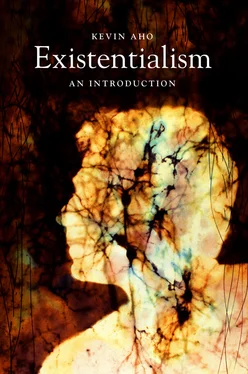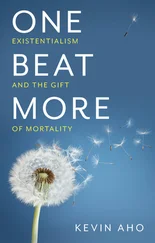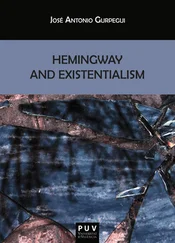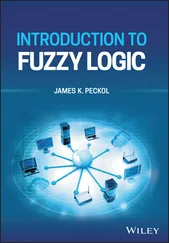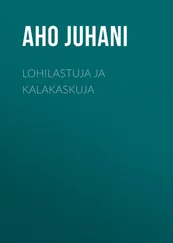In order to understand Sartre's view of free will, we have to return to the phenomenological roots of his project. As we saw earlier, twentieth-century existentialists were indebted to Husserl's idea that human consciousness has an intentional structure, meaning that it always has an objective correlate; it is always of something . Consciousness is not, as Descartes had envisioned, an object or thing that is grasped in the reflective ‘I’ or cogito. Consciousness “is not [an] object,” as Sartre explains, “nor is it the ‘I’ of consciousness” (1957, 41). Indeed, consciousness is not a thing or substance at all. It is a relational activity or process, a no-thing that is always pointing away from itself, always directed toward objects outside it. “When I run after a streetcar,” for example, “there is no I. There is consciousness of the streetcar-having-to-be-overtaken ” (49). Given this account, consciousness is intentionality, and it has no ‘inside.’ “It is just this being beyond itself, this absolute flight, this refusal to be substance which makes it a consciousness” (Sartre 2002, 383). On Sartre's view, consciousness is always “bursting toward” beings in the world, “tearing us out of ourselves” (382).
In addition to the idea of intentionality, Sartre also borrows Husserl's idea that consciousness is a meaning-giving activity. Acts of consciousness are not passive representations of objects in the world. They actively endow objects with the meaning and significance that they have. This means that when I perceive things, I perceive them as such . I don't just see the tree. “[I] see it just where it is: at the side of the road, in the midst of the dust, alone and writhing in the heat, eight miles from the Mediterranean coast” (Sartre 2002, 383). The fact that we see things as ‘this, and not that,’ means that our acts of consciousness inject a ‘not’ or ‘nothingness’ into the world. Consciousness allows us to pick things out, to make meaningful distinctions in the world by means of negation. Thus, to see the tree as a source of shade is to give meaning to it, and this requires seeing it as not something else (e.g., as a source of firewood). In this sense, our acts of consciousness carve up and order reality for us or ‘for-itself’ ( pour soi ), making it fit our own needs and concerns. Without consciousness, all we would encounter is formless being, the naked and disordered ‘in-itself’ ( en soi ) of things. Consciousness, then, is the free ‘upsurge’ of will that gives meaning to the inchoate plenum of being. On this account, I shape the world around me through my own meaning-giving activity, and therefore I alone am responsible for how the world matters to me.
Understanding this duality between ‘being’ and ‘nothingness’ allows us to better understand human existence as a tension between facticity and transcendence. Whatever limits or constrains us in terms of our facticity is something we can always transcend because we can reflect on it and give it meaning by choosing to interpret it in a particular way. If I am born into abject poverty, for instance, this may be seen as a limitation that restricts my possibilities in the future, and I may choose to resign myself to this situation. But I also have the capacity to reject the interpretation that my poverty is a limitation and embrace it as something that gives my life character, allowing me to appreciate my accomplishments more and enabling me to relate with compassion to others in similar circumstances. In either case, there is always a gap or a fissure — a ‘nothingness’ — between my being ‘in-itself’ and my being ‘for-itself’ (Guignon and Pereboom 2001, 265). Regardless of the path or identity I happen to choose, I am not that person. My identity is penetrated by a ‘not’ because I can always question myself and assign different meanings and interpretations in the future. Ortega y Gasset will refer to this aspect of our existence in terms of ‘plasticity.’ “Man is an infinitely plastic entity of which one may make what one will precisely because of itself it is nothing save only the mere potentiality to be ‘as you like’ ” (1941, 203–204). We are ‘plastic’ because we are always making ourselves who we are. And this process of self-making is itself nihilating.
This helps us to understand why the existentialists reject the idea that there is a pre-given essence to human being. “If man, as the existentialist conceives him, is indefinable,” says Sartre, “it is because at first he is nothing . Only afterward will he be something, and he himself will have made what he will be. Thus, there is no human nature” (2001, 293). There is no aspect of our facticity that absolutely determines or defines us because our being ‘in-itself’ is always being negated by our being ‘for-itself.’ Our facticity can reveal itself to us only by being imbued with meanings that are constituted by the projects and self-interpretations that we choose. This is why Sartre claims that “human reality is constituted as a being which is what it is not [for-itself] and which is not what it is [in-itself]” (1956, 107, my emphasis).
This, however, does not mean that Sartre is claiming that humans can do whatever they want. It would be absurd, for instance, to say that the slave in chains can do whatever the master does because the slave inhabits a situation that limits his actions in particular ways. But, for Sartre, the slave is just as free as the master in terms of the meanings and values that he can ascribe to his situation. He explains in the following passage:
When we declare that the slave in chains is as free as his master, we do not mean to speak of a freedom which would remain undetermined. The slave in chains is free to break them ; this means that the very meaning of his chains will appear to him in the light of the end which he will have chosen: to remain a slave or to risk the worst in order to get rid of his slavery. Of course the slave will not be able to obtain the wealth and the standard of living of his master; but these are not the objects of his projects; he can only dream of the possession of these treasures. The slave's facticity is such that the world appears to him with another countenance and that he has to posit and to resolve different problems; in particular it is necessary fundamentally to choose himself on the ground of slavery and thereby to give meaning to this obscure constraint. (1956, 703)
From this, we can see that when Sartre speaks of ‘absolute’ or ‘radical’ freedom, he does not mean that there are no limits or constraints on the ways we can act, but that these limits gain their meaning from us . In addition, because there are an infinite number of meanings that any situation can have, there is nothing that ultimately compels me to interpret things in one way rather than another. It is up to me alone to determine how things are going to matter to me. For this reason freedom is invariably accompanied by “forlornness” and “anguish” (Cooper 1999, 154).
We are ‘forlorn’ when we realize that we have been abandoned to a world that is not of our choosing and that offers no underlying support or plan for our lives. And we are in ‘anguish’ when we recognize that we alone are responsible for who we are and what we do. On this account, anguish discloses the predicament of what Sartre calls being “left in the realm of possibility” (2001, 299), where we confront a dizzying array of possible meanings and that we alone are answerable for the meanings that we choose. Anguish, then, is not to be confused with fear because it is not directed at a specific object out there in the world; it is directed at oneself as an incarnation of our vertiginous freedom. “Anguish is distinguished from fear,” says Sartre, “in that fear is fear of being in the world whereas anguish is anguish before myself ” (1956, 65, my emphasis).
Читать дальше
